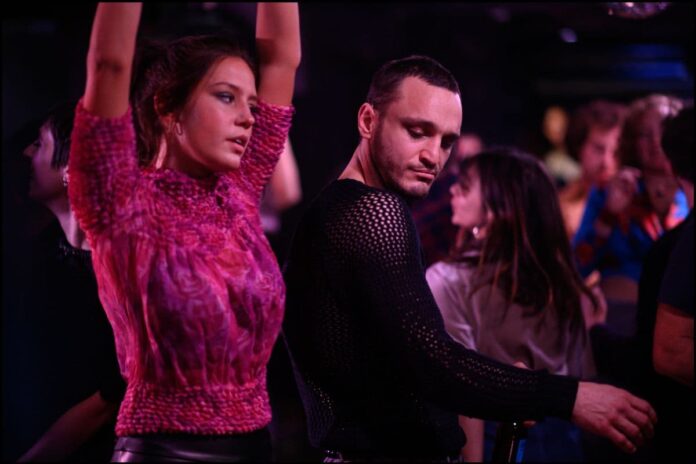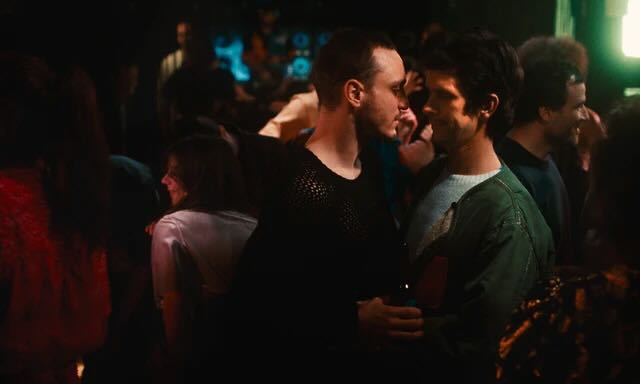
From 2019 to today, many things have changed, and so have they arcade with what Ira Sachs (Love Ringtones – Love is weird little men) to our cinemas is quite different from Frankie with Isabelle Huppert which made a huge impression at the Cannes Film Festival that year. Presented at the Sundance Film Festival and then at the Berlinale – after much appreciated private previews at the beginning of the month – from August 17 Moby and Lucky Red give us a modern, ironic take on the battle of the sexes.
Produced by Saeed bin Saeed (Elle, Bakurao) and Michel Merckt (Meet Toni Erdmann), inside arcade Desires and neuroses intertwine Ben and Shawbut above all by the couple Franz Rogowski (Recently seen in panicking to Gabriel Mainetti and the disco boy Written by Giacomo Abbruzzi) and the wonderful and unforgettable hero Adele’s life Awarded with the Palme d’Or in 2013, Adele Exarchopoulos. They hold the key to what the director himself defines as a “movie cast,” who relied on them to get something that simply couldn’t have been in the script.
Even in terms of eroticism and instinct, there are two elements that – besides the sex scenes that enrich the film and the relationships between the characters – have not been held in high esteem before. Censorship. Meanwhile, the United States, which has banned the film, is targeting the 17-year-old minor. A decision made by the director – founder of Queer | Art Organization – that “dangerous“for his fight”The possibility of a fictitious LGBTQ+ communityTo which Moby responded—considering it “unexpected” and “disappointing”—by distributing the film in the United States without rating.
A film so topical that it was seen as a statement of vaunted fluidity?
In my experience, what matters is the impact of the film on the audience. Then, in terms of what the public sees in it, there’s a catchphrase that if you want to send a message, you have to use Western Union. I didn’t want to send messages, but certainly a movie or a screenplay can be built, structured, interpreted or read in different ways. And that aspect is certainly there, too, even if it wasn’t my intention to make a thematic movie. In general, I’m talking about a change of generations. There was this passage that perhaps today allows us to see human relations and relationships, emotional and sexual, in a new and different way in which differences are allowed.
Three well-produced actors thanks to three well-built personalities, how were they born?
I made the movie on Rogowski, after I saw it in Haneke’s Happy End, and started writing it during the first lockdown. A period when I felt a great sense of insecurity. I wasn’t sure if cinema would survive and felt the need to work on a movie that I wanted to see, and a genre that I would like to see if cinema survived. A movie about actors who also took risks. At the time, I had seen Visconti’s latest film, The Innocent, and it inspired me, not just for the story structure. As a director and as a man of influence, I struggled with a lack of control About my world and my environment, and in a way I felt connected to Giancarlo Giannini, but we all still felt inspired by the movie, even through the whole creative process.
But not just for Giannini, right?
The feeling Franz Rogowski aroused in me was the same feeling I had for Laura Antonelli. Although I had always identified as gay, and had a romantic history in that sense, hearing these feelings about the character I played was so gratifying. Even as a filmmaker, this enthusiasm has taken me in a different direction. I thought about what would happen if my muse, my sexy muse, changed. During filming I was fifty-five, but the protagonists are much younger, there is no theme of homosexual identity, perhaps today there is a different approach, a generational difference that somehow makes the film – set in the day – very topical.
Did Rogowski’s infatuation also affect the nature of the character?
From the movie’s opening sequence, there’s definitely something of mine in his position, in his power, there’s masculinity, and my being white, but there’s always a lot they bring to the characters. And also because I avoid exercise so as not to hinder them, and to give them a creative environment, to discover themselves, even if it means taking risks. Thomas is a man of authority, and ends up on the floor, but the way he does it has its own choreography. Which is curious because Frank had thought of being a dancer early in his career, and even though today he says he can’t dance, his body is like a work of art, a sculpture, that he knows he can convey something with.

There is coherence in personality, which is that he is constantly in motion by desire. There is a gap between what he has and what he would like to have, from start to finish. Consistent, on a subject always guided by pleasure. My intention, as a director, was to offer something to the audience, in some way to give them pleasure, through the different elements of the film, from the colors to the physicality of the actors, in every scene. Something that demonstrates research done and focus on detail.
The pleasure and physicality that also return to the sex scenes, even those that pay so much attention to detail, are almost choreographed, despite the fact that homosexual love is still a taboo …
I know from experience that you can’t write a sex scene entirely for the actors, they have to play it, it’s in their hands. You can create a situation in which they move, and my job is to comfort them, to make them feel confident and respected, and then it’s left to their improvisation, the movement of their bodies to express what I had to describe. on the page in detail. They can do all the paragraphs of the scene with the body. Something I would not have done, that while directing them I am also an observer, going public and feeling what the viewer is feeling.
As for the taboos, we live with the conviction that everything goes, that progress moves in a specific direction, that things get better with time, also thanks to the culture that makes us more open, but in fact, to do the film, I had to go back to the seventies and eighties, to Chantal Ackermann, to Acatone, to Visconti, to go back to the period when we were less oppressive also to remind myself of what I could say with pictures. Going back to that period allowed me to create unabashed scenes.

“Lifelong beer expert. General travel enthusiast. Social media buff. Zombie maven. Communicator.”

